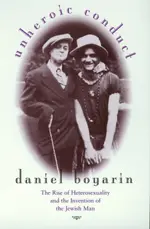

Unheroic Conduct: The Rise of Heterosexuality and the Invention of the Jewish Man
Pages
433
Publisher
University of California Press
Published
6/1/1997
ISBN-13
9780520210509
Disciplines
Sociology
Gender
Download cover image >
Create a flier for this title >
Unheroic Conduct
The Rise of Heterosexuality and the Invention of the Jewish Man
by Daniel Boyarin (Author)
June 1997
First Edition
Paperback
$33.95, £28.00
Series
Contraversions: Critical Studies in Jewish Literature, Culture, and Society
Title Details
Rights: Available worldwide
Pages: 433
ISBN: 9780520210509
Trim Size: 6 x 9
Illustrations: 16
Share
Request an Exam or Desk Copy
Recommend to Your Library (PDF)
RightsLink
Rights and Permissions
Buying Options
About the Book
About the Author
Reviews
Related Books
About the Book
In a book that will both enlighten and provoke, Daniel Boyarin offers an alternative to the prevailing Euroamerican warrior/patriarch model of masculinity and recovers the Jewish ideal of the gentle, receptive male. The Western notion of the aggressive, sexually dominant male and the passive female reaches back through Freud to Roman times, but as Boyarin makes clear, such gender roles are not universal. Analyzing ancient and modern texts, he reveals early rabbis—studious, family-oriented—as exemplars of manhood and the prime objects of female desire in traditional Jewish society.
Challenging those who view the "feminized Jew" as a pathological product of the Diaspora or a figment of anti-Semitic imagination, Boyarin argues that the Diaspora produced valuable alternatives to the dominant cultures' overriding gender norms. He finds the origins of the rabbinic model of masculinity in the Talmud, and though unrelentingly critical of rabbinic society's oppressive aspects, he shows how it could provide greater happiness for women than the passive gentility required by bourgeois European standards.
Boyarin also analyzes the self-transformation of three iconic Viennese modern Jews: Sigmund Freud, the father of psychoanalysis; Theodor Herzl, the founder of Zionism; and Bertha Pappenheim (Anna O.), the first psychoanalytic patient and founder of Jewish feminism in Germany. Pappenheim is Boyarin's hero: it is she who provides him with a model for a militant feminist, anti-homophobic transformation of Orthodox Jewish society today.
Challenging those who view the "feminized Jew" as a pathological product of the Diaspora or a figment of anti-Semitic imagination, Boyarin argues that the Diaspora produced valuable alternatives to the dominant cultures' overriding gender norms. He finds the origins of the rabbinic model of masculinity in the Talmud, and though unrelentingly critical of rabbinic society's oppressive aspects, he shows how it could provide greater happiness for women than the passive gentility required by bourgeois European standards.
Boyarin also analyzes the self-transformation of three iconic Viennese modern Jews: Sigmund Freud, the father of psychoanalysis; Theodor Herzl, the founder of Zionism; and Bertha Pappenheim (Anna O.), the first psychoanalytic patient and founder of Jewish feminism in Germany. Pappenheim is Boyarin's hero: it is she who provides him with a model for a militant feminist, anti-homophobic transformation of Orthodox Jewish society today.